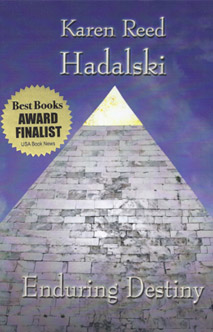During each 4th of July, my thoughts turn to our nation’s and the world’s warriors. What are their personal qualities? Why do they choose such a vocation? Can one with a warring mentality be a spiritual, high-minded person, as well?
Since I tend to view the latter as being peaceful, centered, and internally motivated, to believe that one can be both would seem a contradiction in terms. However, while writing Karma, I gained new and different insights. One section of the book features interviews with and profiles of people who believe in reincarnation and karma, and one of those written about is General George S. Patton, the distinguished U.S. Army General from WW II.
I only included him because I wanted to provide a broad sampling of people from diverse backgrounds and occupations and remembered him as one who openly discussed these beliefs. While researching his background, I learned that he came into the world with past-life memories intact, innate talents and skills, a self-perceived knowledge of his soul’s purpose, and an extraordinary drive to fulfill it. He “knew” he was meant to become a great soldier as clearly as he “knew” he had fought on numerous battlefields throughout a series of past lives.
Patton was also a poet; and, in his lengthy poem, “Through a Glass Darkly,” he writes:
So as through a glass, and darkly
The age long strife I see
Where I fought in many guises,
Many names, but always me.
So forever in the future
Shall I battle as of yore,
Dying to be born a fighter,
But to die again, once more.
Patton clearly believed his destiny was to continually be born and die a warrior. And, his prolific writings seem to indicate that he understood “destiny” to be the result of uniting one’s personal will with the will of God.
I had a hard time entertaining Patton’s view that it could be God’s will that anyone should actualize and perfect him/ herself a “perpetual warrior.” This reluctance emanated from my personal bias against viewing war as a noble endeavor or acknowledging military types as the highest expression of humanity the world has to offer. Yet, I also felt moved to delve more deeply into this bias. When I did so, I bagan to recall the many portrayals of warriors in religious literature, myth, legend, and history.
For instance, Archangels are Principal angels. One of the nine orders of celestial attendants of God, they are pure spirit and have never descended into human form. Archangel Michael has forever been depicted as an armored, sword-wielding warrior, and there are many biblical references to God’s “army,” “legions,” and “hosts” of angels.
Several revered saints were soldiers, including St. Louis, the Crusader King of France; St. George, the dragon-slaying Christian Knight who is the patron Saint of England; and the visionary soldier and martyr, St. Joan of Arc.
Many godly men of the Old Testament were men-of-arms, including King David, Samson, and Joshua. There existed religious-military orders, such as Knights Templar’s and the institution of medieval knighthood–the Age of Chivalry–which refers to combatants of courage, valiance, generosity, courtesy, and gallant behavior on behalf of society’s weakest members–especially women.
Many of the friends and acquaintances I interviewed discussed their views about war and soldiering in thought-provoking ways, as well. Most noted a distinction between types of and causes for wars, noting that, though generally pacifistic, they would enlist for battle in wars being waged for causes they believed in–such as those which prompted American involvement in WW II. Others noted that if it became necessary to defend themselves, their family, their country, or their freedoms they would willingly enlist.
Still others stated they would enlist only if every possible effort had been exerted to resolve differences and injustices and had failed. One noted that Jesus said, the greatest expression of love is one who gives up his life for his friends; and that those who truly believe in a cause, and perish in defense of their comrades or innocent civilians, might be expressing ” a very high form of love.” Another feels that, if one does engage in battle for what they believe to be a just cause, he or she should look to the Bhagavad-Gita for guidance and strive to perform their duty with the “detachment” this holy book describes.
Much to think about. And, when combined with the selfless, heroic stories and motivations of the many wounded troops interviewed on television yesterday, I think it is time to let go of my long-held bias and admit that warriors can, indeed, be spiritual, high-minded, and engage in battle.



